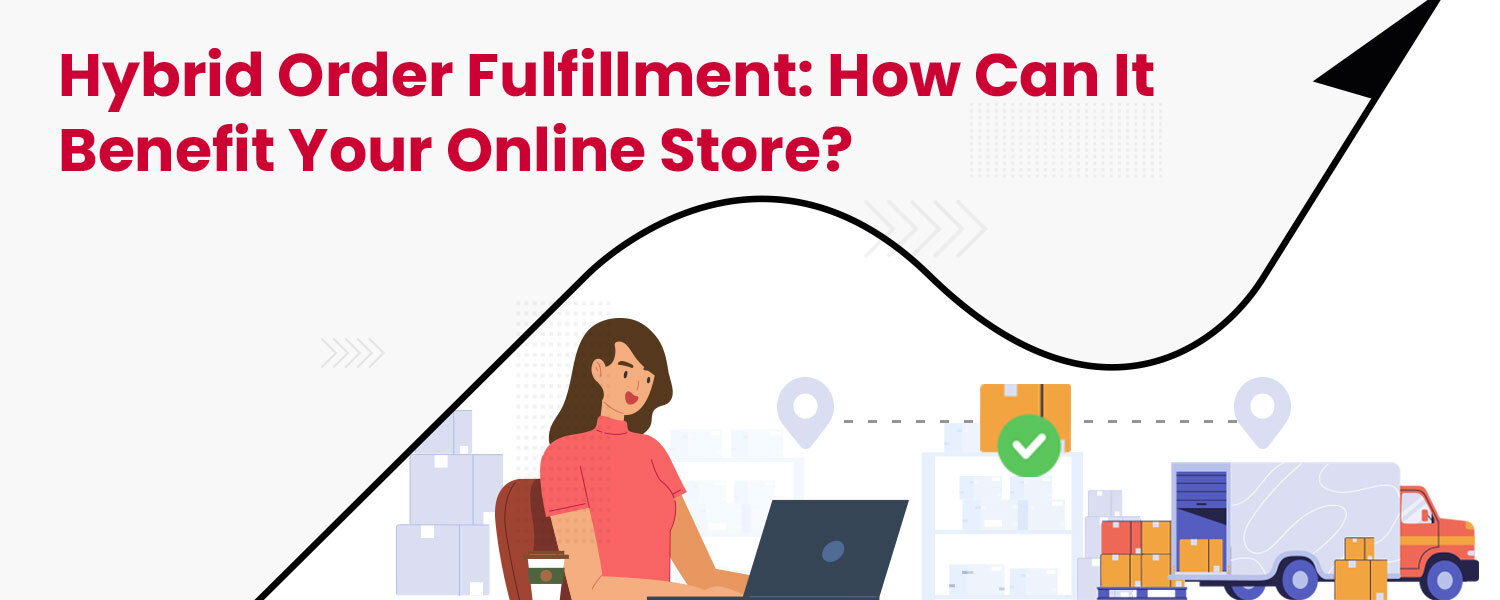Delivering orders quickly and efficiently has become the name of the game in eCommerce. Customers today expect nothing short of exceptional service, and any delay or hiccup in the fulfilment process can lead to unhappy customers and a tarnished reputation.
Have you ever wondered if there is a way to accelerate your online store’s fulfilment process without sacrificing control, flexibility, and cost-effectiveness? Finally, a solution exists which is Hybrid order fulfilment.
As an innovative and dynamic solution to the challenges of eCommerce fulfilment, hybrid order fulfilment combines the best of multiple fulfilment models, like in-house fulfilment, dropshipping, and third-party logistics (3PL). This approach allows you to harness the strengths of each model and create a seamless and cost-effective fulfilment system tailored to your online store’s unique needs.
This blog is where we’ll explore the ins and outs of this hybrid fulfilment strategy and discover how it can benefit your online store’s operations.
What is Hybrid Order Fulfillment?
Hybrid order fulfilment is the answer to the need to offer flexibility and diversity strategy to supply chain management. At its core, hybrid order fulfilment is a method that blends various fulfilment models, such as in-house fulfilment, dropshipping, and third-party logistics (3PL), to create a customized and efficient fulfilment process tailored to your unique business needs.
By incorporating the best of each model, eCommerce businesses can optimize their supply chains and cater to diverse order types, whether focused on direct-to-consumer (D2C) or business-to-business (B2B) eCommerce.
Consider an online store that sells both self-manufactured products and items obtained from various suppliers. By utilizing a hybrid order fulfilment strategy, this store can manage the fulfilment of its own products in-house and rely on dropshipping for supplier-sourced products. Furthermore, they can collaborate with a third-party logistics (3PL) provider for warehousing and shipping support, guaranteeing a smooth, economical, and effective fulfilment process.
Benefits of Hybrid Order Fulfillment for Your Business
Flexibility in Operations
Hybrid order fulfilment allows you to adapt different fulfilment strategies to meet your ever-evolving business needs. By leveraging multiple methods, you can address unique challenges and capitalise on new opportunities as they arise. This brings flexibility to your order fulfilment process.
Therefore, as order volumes increase and customer demands shift, you can adjust your strategy to ensure continued success. Whether you need to expand your product offerings, penetrate new markets, or optimize your supply chain, hybrid fulfilment empowers you to make these adjustments seamlessly.
Faster Growth and Order Processing
A key advantage of adopting a hybrid order fulfilment strategy is the potential for accelerated growth and more efficient order processing. By utilising multiple fulfilment methods, you can optimise your operations for quicker turnaround times. This increased efficiency means orders are processed and shipped more swiftly, leading to higher customer satisfaction.
Moreover, faster order processing and shorter delivery times can significantly boost your eCommerce business’s reputation, as customers appreciate prompt service and quick delivery. As word spreads about your company’s efficiency and reliability, you’re likely to attract new customers and build lasting relationships with your existing client base.
Experimentation with Different Models
By integrating multiple fulfilment methods, you can test and compare their effectiveness in various scenarios. In addition, this hands-on approach allows you to fine-tune your fulfilment strategies based on product types, target regions, and customer preferences.
It also enables you to customize your approach for specific products or markets. For instance, you might find that dropshipping is more suitable for a particular product line or that 3PLs offer better service in a specific region. This level of customization ensures that you can provide the best possible service to your customers, regardless of their location or the products they purchase.
Cost-effectiveness
One of the primary ways hybrid order fulfilment contributes to cost-effectiveness is by enabling you to select the most suitable method for each product and circumstance. For instance, if you’re dealing with large or bulky items, it may be more economical to use a 3PL that specializes in handling such products rather than investing in additional storage space. Similarly, when launching a new product line, utilizing dropshipping can help you save money while gauging market demand before making more substantial investments.
Reach New Customers
With a hybrid model, you can cater to different customer segments by offering tailored delivery options that suit their needs and preferences. For instance, by partnering with a 3PL that specializes in international shipping, you can attract customers from overseas who may have been deterred by high shipping costs or long delivery times. Similarly, dropshipping can allow you to offer a wider range of products, appealing to a more extensive customer base.
Process of Hybrid Order Fulfillment
Assessing Your Business Needs
To successfully implement a hybrid order fulfilment strategy, start by assessing your business needs. Evaluate the types of products you offer and the nature of your inventory, considering factors such as size, weight, and perishability.
Selecting the Right Combination of Fulfillment Models
Next, weigh the pros and cons of various fulfilment models such as in-house fulfilment, drop shipping, and 3PL. Then, after a thorough evaluation, choose strategic partners for each fulfilment model to ensure seamless integration of services and a reliable supply chain.
Implementing the Hybrid Fulfillment Strategy
Once you have selected the appropriate fulfilment models, integrate them into your existing operations. Establish clear communication channels and coordinate effectively between your various fulfilment partners.
Monitoring and Optimization
Continuously monitor the performance of your hybrid fulfilment strategy by tracking key metrics such as order fulfilment times, delivery accuracy, and customer satisfaction.
Conclusion: How NimbusPost enables growth through fulfilment
As eCommerce continues to evolve, businesses must stay ahead of the curve and adapt to changing customer expectations. Hybrid order fulfilment is a powerful strategy that can help you cater to diverse customer needs, optimize costs, and propel your business to new heights. And with NimbusPost as your trusted partner, you’ll have the perfect fulfilment solution by your side.
NimbusPost’s smart warehousing, cutting-edge warehouse management system, and strategic insights will help you establish an optimized distribution strategy, ultimately reducing shipping costs and delivery times. As your business grows, NimbusPost will be there every step of the way, providing the resources, expertise, and world-class service needed to fuel your eCommerce success.
FAQs
What are the different types of order fulfilment methods?
There are three main types of order fulfilment methods:
- in-house fulfilment
- dropshipping
- third-party logistics (3PL)
What is the order fulfilment process?
The order fulfilment process is a series of steps involved in getting products from a retailer to the end customer. It typically includes the following stages:
- Receiving and storing inventory
- Order processing
- Picking
- Packing
- Shipping
- Delivery
What are hybrid goods examples?
An online clothing store may use in-house fulfillment for their best-selling items, dropshipping for custom or made-to-order products, and 3PL for international orders to reduce shipping times and costs.
What does hybrid mean in logistics?
Hybrid logistics refers to the combination of multiple order fulfilment methods to optimize the supply chain and improve overall efficiency. This approach typically integrates in-house fulfilment, third-party logistics (3PL), and dropshipping to provide businesses with greater flexibility, cost-effectiveness, and the ability to scale operations.
What are the 5 aspects of fulfilment?
The 5 aspects of fulfilment, based on the above research, are:
- Receiving and storing inventory
- Order processing
- Shipping
- Returns management
- Customer service




